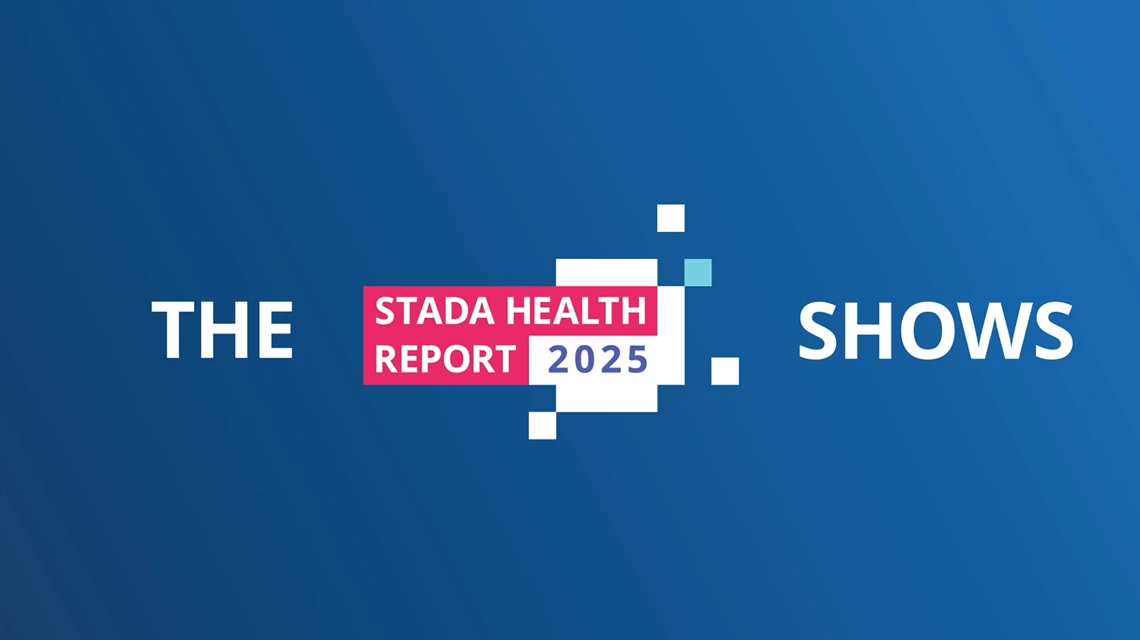Select your country
Websites worldwide
Select a country to go to the website of the respective STADA sales company.
Australia (1)
Austria (1)
Belarus (1)
Belgium (1)
Bosnia-Herzegovina (1)
Bulgaria (1)
China (1)
Croatia (1)
Czech Republic (2)
Denmark (1)
France (1)
Hungary (1)
Ireland (1)
Italy (1)
Montenegro (1)
Netherlands (2)
Poland (1)
Portugal (1)
Romania (1)
Serbia (1)
Slovakia (1)
Slovenia (1)
Spain (1)
Switzerland (1)
Thailand (1)
The Phillippines (1)
United Kingdom (3)
Vietnam (2)
- 26/06/2025
-
STADA Health Report 2025: A healthy life – desired by many, lived by only half of Europeans
- STADA Health Report 2025: independent representative survey of 22 European countries reveals that although satisfaction with healthcare systems has stabilized, only half of Europeans deem their healthcare system fair in terms of access and services, fostering insecurities about future care in case of serious illness.
- Europeans strive for healthy living – but only 1 in 2 succeed. Aside from motivational problems, they are held back by financial pressure, mental health challenges and limited access to care.
- Peter Goldschmidt, CEO STADA: “At STADA, our purpose is to care for people's health as a trusted partner. With the STADA Health Report, we gain valuable insights and understand future trends. By sharing this independent, anonymous data with stakeholders in the healthcare sector, we help to improve lives by enabling better decisions.”
Bad Vilbel, 26 June 2025 – Although satisfaction with healthcare systems has stabilized compared to previous years and now lies at 58 percent on average, Europeans make it clear that satisfaction does not equal fairness. The STADA Health Report 2025 shows that barely one in two (51 percent) feel comfortable saying that everyone in their country has equal access to medical care and services, 44 percent even go as far as to call their system “unfair”.
Even the countries with the highest overall healthcare satisfaction, Belgium and Switzerland (81 percent each), exhibit a significant gap in terms of fairness, which only 63 and 68 percent would respectively attribute to their country’s healthcare system. On top of that, a mere 15 percent of Europeans have unreserved faith in their healthcare system’s ability to provide the required care in case of serious illness.
STADA Health Report:
Independent representative online study by Human8 on behalf of STADA.
Anonymous research time frame: February through March 2025.
Sample: Between 1,000-2,000 respondents each from Austria, Belgium, Bulgaria, Czechia, Denmark, France, Germany, Hungary, Ireland, Italy, Kazakhstan, the Netherlands, Poland, Portugal, Romania, Serbia, Slovakia, Spain, Sweden, Switzerland, the United Kingdom and Uzbekistan.
General practitioners and pharmacists as health enablers
Despite this overall view, trust in actors in the healthcare system remains strong. General practitioners (69 percent) and pharmacists (58 percent) continue to rank among the most trusted figures in health, far ahead of Google (20 percent), Artificial Intelligence (15 percent) and online healthcare influencers (11 percent).
Even though trust in artificial intelligence is not yet widespread, openness to the technology is growing steadily. Today, 39 percent of people can already imagine turning to AI for medical advice instead of visiting a doctor. People in Denmark (48 percent) and Sweden (47 percent) are particularly open to this idea. Another 25 percent say they could see themselves consulting with AI in the future, once the technology has matured further. Across Europe, people primarily cite improved accessibility and availability as key reasons for their openness to AI — 49 percent say these are major advantages. In addition, 45 percent believe AI makes healthcare more convenient and time-efficient, as it could reduce the need to see a doctor for every minor illness.
However, personal interaction remains a decisive driver of trust in health matters, turning doctors and pharmacists into enablers of self-managed care. For instance, 40 percent of Europeans mention advice they receive from pharmacy teams as an essential reason for visiting brick-and-mortar pharmacies. They also regard pharmacies as a convenient one-stop shop for all their health needs (30 percent) and value the personal relationships they have with the people working there (28 percent).
Ambition vs. reality in healthy living
Across Europe, health awareness is clearly strong and 96 percent say that a healthy lifestyle is important to them. 72 percent of Europeans regularly engage in preventive habits by exercising, taking nutritional supplements, and healthy eating. Two-thirds (66 percent) now attend some or all preventive checkups, an uptake by 5 percentage points compared to 2023.
However, even if a healthy life is desired by almost everyone, only half of Europeans (51 percent) think they manage to live healthily overall. People in Spain rate their lifestyle the healthiest (68 percent) and, according to Eurostat data, they also have the highest life expectancy on the continent. One of the main inhibitors of healthy living is a lack of motivation, reported by 41 percent of respondents. Still, personal prioritization of health is not the only obstacle. Financial and mental challenges also play a role in making it difficult to maintain a healthy lifestyle.
Financial circumstances stand in the way of healthy living
A recurring pattern in the Health Report 2025: mental health and financial circumstances are decisive reinforcing factors for individual health journeys that create additional barriers to better health for Europeans. Those who worry about money have a harder time leading a healthy lifestyle (36 percent) than their more financially comfortable counterparts (58 percent). People who are struggling financially are generally less likely to be satisfied with their healthcare system (48 percent) and have less faith in its ability to care for them when seriously ill (47 percent) than people who do not worry about money (63 and 64 percent, respectively).
Silent struggles: mental health is a key inhibitor of better health
The link between financial and mental distress is indisputable: those who are struggling financially have a much higher likelihood of experiencing burnout (72 percent) and are less likely to describe their mental health as “good” (49 percent) compared to those feeling financially secure (62 and 72 percent, respectively).
Overall, 64 percent of Europeans describe their mental health as “good” – especially in Romania (84 percent), Bulgaria (80 percent), Serbia and Switzerland (74 percent) as well as France (71 percent). Still, two-thirds (66 percent) have experienced burnout symptoms at least once. Women (71 percent) and people under 35 (75 percent) are particularly affected. People facing mental health challenges are three times less likely to say they live healthily (19 percent) than those with good mental health (62 percent). These findings echo a call for more supportive systems: equal representation of mental and physical health could be a first step in the right direction – currently, only 21 percent of Europeans feel that both these aspects of healthy living are adequately considered in their healthcare system.
“Across physical and mental health,” Goldschmidt summarized, “the STADA Health Report offers trusted insights on relevant healthcare topics, stimulating debate among core healthcare stakeholders, including the media. By recognizing and anticipating trends that are shaping the future of healthcare, this unique research provides the insights needed to best meet patient needs.”
About STADA Arzneimittel AG
STADA Arzneimittel AG is headquartered in Bad Vilbel, Germany. The company focuses on a three-pillar strategy consisting of consumer healthcare products, generics and specialty pharma. Worldwide, STADA Arzneimittel AG sells its products in over 100 countries. In financial year 2024, STADA achieved group revenues of € 4,059 million and adjusted constant-currency earnings before interest, taxes, depreciation and amortization (adj. cc EBITDA) of € 886 million. As of 31 December 2024, STADA employed 11,649 people worldwide.
Additional information for journalists
STADA Arzneimittel AG - Media Relations
Stadastrasse 2-18
61118 Bad Vilbel - Germany
Phone: +49 (0) 6101 603-165
Fax: +49 (0) 6101 603-215
E-Mail: [email protected]
Additional information for capital market participants
STADA Arzneimittel AG - Investor & Creditor Relations
Stadastrasse 2-18
61118 Bad Vilbel – Germany
Phone: +49 (0) 6101 603-4689
Fax: +49 (0) 6101 603-215
E-mail: [email protected]





